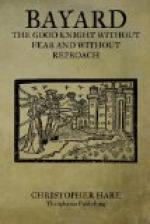According to his usual gallant custom, as the army retired with forced marches towards the Alps, Bayard took command of the rear-guard, and as the Spaniards followed day by day he bore all the brunt of the constant skirmishing which took place. It was a most perilous office, for the enemy was well provided with artillery, and when the Good Knight made a gallant charge with his company and drove back the men-at-arms, he would be attacked by a shower of stones from the arquebusiers. He seemed to bear a charmed life, though ever in the post of danger, for others were wounded or killed while he escaped unhurt until a certain fatal day when the retreating French army had reached the valley of the Sesia beyond Novara. Here it was that Bonnivet saw his expected troop of Swiss allies on the opposite bank of the river, and at once sent word to them to cross over and join him. But what was his dismay when the Swiss captains replied that the King of France had not paid them or kept his word, and they had come to fetch away their comrades who were in the French army. Worse still, when this became known, all the Swiss mercenaries in his camp rose in open rebellion against Bonnivet, and lost no time in crossing the river, overjoyed to leave a losing cause and go back to their homes with so good an excuse.
The unfortunate French commander was in despair and hoping to hide the catastrophe from the pursuing enemy, he ordered a brisk skirmish, in which he took part with plenty of courage and was severely wounded in the arm. The Good Knight Bayard did prodigies of valour, driving back a whole company of arquebusiers, but in the moment of triumph he was struck by the stone from an arquebus and received mortal injury. Raising the hilt of his sword in the sign of the cross, he cried aloud: “Miserere mei, Deus secundum magnam misericordiam tuam!” He refused to be taken away, saying that he had never turned his back on his enemy, and his faithful steward Jacques Jeffrey and his squire lifted him from his horse and placed him with his back to a tree, still facing the foe with a brave countenance.
We have a most pathetic and touching account of this last scene, in which the Good Knight without Fear and without Reproach died as he had lived, bearing himself with humble devotion towards God and loving care and thought towards all men. His friends would have borne him away, but he implored them to leave him and seek their own safety, for he was in such terrible pain that he could not endure to be moved. He sent his last salutations to the King his master, and to all his companions, and took an affectionate leave of his heart-broken friends, who obeyed his command, all but the one faithful attendant who remained with him to the end. This was his steward, Jacques Jeffrey, and we are told of the poor man’s grief and despair, while his master sought to comfort him with brave and noble words. “Jacques, my friend, cease your lament, for it is the will of God to take me away from this world where by His grace I have long dwelt and received more good things and honours than I deserve. The only regret that I have in dying is that I have failed in my duty ... and I pray my Creator in His infinite mercy to have pity on my poor soul....”




